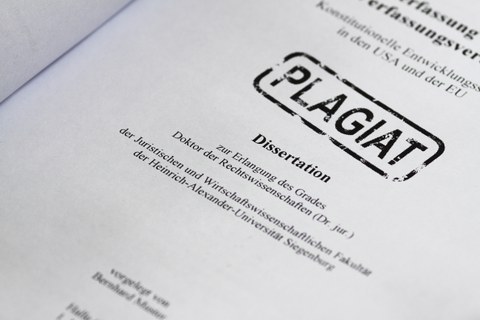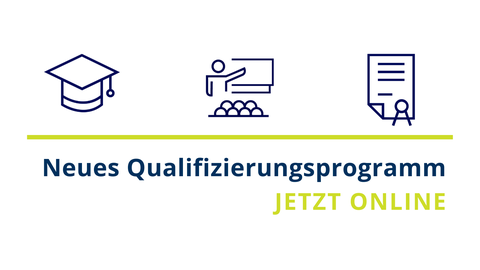Gute wissenschaftliche Praxis
Inhaltsverzeichnis
Eigenplagiat, Salamitaktik, Ehrenautor:innenschaft … nicht immer sind wissenschaftliche Verfehlungen vorsätzlich.
Mit ihrem Anspruch auf Autonomie hat die Wissenschaft aber auch eine besondere Verantwortung und Sorgfaltspflicht.
Dementsprechend wichtig ist es, sich intensiv mit den Standards guter wissenschaftlicher Praxis (GWP) auseinanderzusetzen.
Die Prinzipien guter wissenschaftlicher Praxis verlangen, dass alle Wissenschaftler:innen "lege artis" (d.h. nach den Regeln der Kunst) arbeiten.
Dazu gehören unter anderem:
- der korrekte Umgang mit Daten,
- alle Ergebnisse kritisch zu hinterfragen,
- strikte Ehrlichkeit im Hinblick auf die eigenen und auf die Beiträge Dritter zu wahren
- wissenschaftliches Fehlverhalten zu vermeiden und vorzubeugen.
Mögliche Verstöße gegen die Regeln guter wissenschaftlicher Praxis sind vielfältig. Beispielsweise liegt wissenschaftliches Fehlverhalten vor, wenn bewusst oder grob fahrlässig:
- Daten oder Quellen erfunden oder verfälscht werden,
- Sie Forschungstätigkeiten Anderer beeinträchtigen,
- geistiges Eigentum verletzen (z. B. durch Plagiat oder Ideendiebstahl),
- Dritte fälschlich des wissenschaftlichen Fehlverhaltens beschuldigen,
- von Fälschungen wissen und nichts dagegen unternehmen,
- die Aufsichtspflicht vernachlässigt wird.
Gute wissenschaftliche Praxis an der TU Dresden
Alle Angehörigen der TU Dresden sind verpflichtet, die Satzung zur Sicherung guter wissenschaftlicher Praxis zu befolgen und aktiv zur Vermeidung wissenschaftlichen Fehlverhaltens beizutragen.
Wissenschaftliches Fehlverhalten wird an der TU Dresden nicht toleriert. Verdachtsfälle werden sorgfältig und mit Respekt gegenüber den Beteiligten geprüft. Bei bestätigtem Verdacht werden angemessene Maßnahmen ergriffen.
Alle Informationen sowie weitere Leitlinien und Hinweise zu Schulungsangeboten finden Sie auf der folgenden Webseite: Gute wissenschaftliche Praxis an der TU Dresden.
Die Technische Universität Dresden hat die Satzung zur Sicherung guter wissenschaftlicher Praxis, zur Vermeidung wissenschaftlichen Fehlverhaltens und für den Umgang mit Verstößen erlassen.
Alle Mitglieder und Angehörigen der TU Dresden sind verpflichtet, diese Satzung zu befolgen, sie zur Grundlage ihres wissenschaftlichen Arbeitens zu machen und in ihrem Wirkungsbereich aktiv zur Vermeidung wissenschaftlichen Fehlverhaltens beizutragen.
Die Ombudsperson ist Ansprechpartner:in, Ratgeber:in und Vermittler:in bei allen Verdachtsfällen von wissenschaftlichem Fehlverhalten. Sie wird bei Bedarf durch die Prüfstelle gegen wissenschaftliches Fehlverhalten unterstützt.
Ihre Anzeige wird vertraulich behandelt. Die Vertraulichkeit dient dem Schutz des Whistleblowers sowie der Person, gegen die sich ein Verdacht richtet.
Die Ombudsperson steht im regelmäßigen Austausch mit den Vertrauenspersonen der Fakultäten, der Prüfstelle für wissenschaftliches Fehlverhalten sowie den übrigen Beratungsstellen der TU Dresden.
Konfliktfälle, die nicht mit wissenschaftlichem Fehlverhalten zu tun haben, können mit dem Einverständnis der informierenden Person an die zuständigen Stellen der TU Dresden (z.B. Personalrat, Konfliktmediator:in der Graduiertenakademie, psychosoziale Beratung etc.) vertraulich weitergeleitet werden.
Liegt aus der Sicht der Ombudsperson ein begründeter Verdacht auf wissenschaftliches Fehlverhalten vor, wird dieser durch die Untersuchungskommission oder in Verdachtsfällen, in denen das Fehlverhalten akademische Prüfungen (z.B. Bachelor-, Master-, Diplomprüfungen) oder Graduierungen (Promotionen, Habilitationen) betrifft, durch das in der jeweiligen Prüfungs- und Graduierungsordnung vorgesehene reguläre Prüfungsgremium begutachtet.
Kontakt
Die Prüfstelle für gute wissenschaftliche Praxis unterstützt die Ombudsperson, die Untersuchungskommission sowie die regulären Prüfungsgremien bei Verdacht auf wissenschaftliches Fehlverhalten.
Die Prüfstelle für gute wissenschaftliche Praxis nimmt Verdachtsmeldungen vertraulich entgegen und klärt über mögliche Verfahrensschritte auf. Das Recht, sich unmittelbar an die Ombudsperson oder die Untersuchungskommission zu wenden, bleibt hiervon unberührt.
Die Prüfstelle für gute wissenschaftliche Praxis bietet bei Verdacht auf wissenschaftliches Fehlverhalten an, Abschlussarbeiten (z.B. Bachelor-, Master-, Diplomprüfungen) oder Graduierungen (Promotionen, Habilitationen) mittels einer Plagiatserkennungssoftware auf Plagiate zu überprüfen.
Kontakt
Jede Fakultät bestellt je eine Wissenschaftlerin und einen Wissenschaftler als Vertrauenspersonen, die die ersten Ansprechpersonen für den wissenschaftlichen Nachwuchs auf Fakultätsebene sind.
Liste der Kontaktdaten der Vertrauenspersonen der Fakultäten (Download)
Die Vertrauenspersonen dienen dem wissenschaftlichen Nachwuchs (insbesondere Promovierenden) als Ansprechpartner. Sie vermitteln insbesondere auch in problematischen Situationen. Bei Bedarf und erst nach Zustimmung der ratsuchenden Person können sie den Konfliktfall an die Ombudsperson weitergeben.
Das Recht, sich direkt an die Ombudsperson zu wenden, bleibt davon unberührt.
Darüber hinaus stehen Ihnen in allen fünf Bereichen der TUD, sowie am cfaed, am CRTD sowie in der Graduiertenschule DIGS-BB zertifizierte Ansprechpartner: innen zur Verfügung, die fachspezifische Trainings zur guten wissenschaftlichen Praxis anbieten.
Liste der Kontaktdaten aller Ansprechpartner:innen und Trainer:innen zur guten wissenschaftlichen Praxis
Im Laufe des wissenschaftlichen Prozesses entsteht eine Vielzahl von Daten. Diese Forschungsdaten können sowohl durch qualitative als auch quantitative Forschung, z.B. durch Interviews, Befragungen, Experimente oder Beobachtungen entstehen und in analoger oder digitaler Form u.a. als Textdokumente, Tabellen, Logbücher, Fragebögen, Audio- und Videoaufzeichnungen, Proben, Sammlungen, Datenbankinhalte oder Protokolle vorliegen.
Die langfristige Archivierung von Forschungsdaten ist eine Voraussetzung für die Nachvollziehbarkeit von wissenschaftlichen Ergebnissen.
Leitlinien für den Umgang mit Forschungsdaten an der TU Dresden
Bitte informieren Sie sich auch auf den Webseiten der Kontaktstelle Forschungsdaten.
Das Zentrum für Weiterbildung (ZfW) bietet regelmäßig Workshops zum Thema Die Regeln guter wissenschaftlicher Praxis im Forschungsalltag für Professor:innen der TU Dresden an.
Unter dem folgenden Link finden Sie die nächsten Termine für Workshops zu guter wissenschaftlicher Praxis für Professor:innen (Link).
Gute wissenschaftliche Praxis | Graduiertenakademie
Machen Sie sich frühzeitig mit den Grundprinzipien guter wissenschaftlicher Praxis vertraut!
Die Graduiertenakademie unterstützt Sie mit einem breiten, speziell auf Ihre Bedürfnisse abgestimmten Schulungs- und Beratungsangebot.
Zertifikatskurs für Promovierende | 3 Online-Module
Als Promovierende:r an der TU Dresden sind Sie verpflichtet, bis zur Einreichung Ihrer Dissertation eine Schulung zur guten wissenschaftlichen Praxis (GWP) zu absolvieren.
Das entspricht der Satzung zur Sicherung guter wissenschaftlicher Praxis1 und den Bestimmungen der Promotions-ordnung Ihrer Fakultät.
- Der Zertifikatskurs besteht aus drei aufeinander aufgebauten Modulen mit einem zeitlichen Gesamtumfang von ca. 4 Stunden.
- Nach erfolgreichem Abschluss aller drei Module erhalten Sie ein Zertifikat, das Sie beim Promotionsamt einreichen oder in Ihre Promovendus-Akte hochladen können.
- Alternativ zu unserem modularen Zertifikatskurs können Sie auch die regulären GWP-(Online-)Workshops in unserem Qualifizierungsprogramm besuchen.
- Für mehr Informationen zum Zertifikatskurs lesen Sie bitte die einzelnen Modulbeschreibungen!
GWP-Zertifikatskurs | Anmeldung
Dieser etwa einstündige Online-Kurs zur individuellen Bearbeitung wurde von der Goethe-Universität Frankfurt speziell für Promovierende entwickelt und bietet eine kurze Einführung in die Standards und Prinzipien der Guten wissenschaftlichen Praxis.
Wie funktioniert's?
Sie sind Promovend:in der TU Dresden und möchten den E-Learning-Kurs absolvieren?
Modul 1 | Anmeldung via Opal
Wichtig
- Stellen Sie bitte sicher, dass Ihr Browser Pop-up Fenster zulässt.
- Sollten Sie den Kurs bereits zu einem früheren Zeitpunkt erfolgreich abgeschlossen haben, laden Sie einfach Ihr Zertifikat in Promovendus hoch.
- Bitte beachten Sie, dass es sich hierbei um einen von der Goethe-Universität Frankfurt entwickeltes Tool handelt, d.h. für die Kursteilnahme gelten die Datenschutz-bestimmungen der Goethe-Universität.
Der E-Learning-Kurs "Gute wissenschaftliche Praxis an der TU Dresden", entwickelt von der Graduiertenakademie der TU Dresden, vermittelt Promovierenden die spezifischen Richtlinien, Verfahren und Unterstützungsangebote im Bereich der guten wissenschaftlichen Praxis. Die Teilnehmenden lernen ethische Standards, Dokumentationsanforderungen und institutionelle Unterstützungsstrukturen kennen.
Wie funktioniert's?
- Sie haben das erste E-Learning Modul erfolgreich absolviert?
- Dann melden Sie sich via OPAL für das zweite Modul unseres Zertifikatskurses an.
Bitte beachten Sie, dass Sie dafür ein gültiges ZIH-Log-in benötigen.
Modul 2 | Anmeldung via Opal
Wichtig
- Stellen Sie bitte sicher, dass Ihr Browser Pop-ups erlaubt.
- Bitte laden Sie nach erfolgreichem Abschluss Ihr Teilnahmezertifikat herunter und hinterlegen Sie es in Promovendus.
Dieser 2-stündige interaktive Online-Workshop für Promovierende behandelt Fallbeispiele zur guten wissenschaftlichen Praxis. Teilnehmende analysieren hypothetische Szenarien aus dem Forschungsalltag, diskutieren die vorgestellten Dilemmata in Kleingruppen und erarbeiten gemeinsam Lösungsansätze. Der interaktive Kurs fördert den Austausch und stärkt die Kompetenz im Umgang mit ethischen Herausforderungen in der Forschung.
Anmeldung für Modul 3 | Voraussetzungen
- Sie haben die Module 1 und 2 des Zertifikatskurses erfolgreich absolviert?
- Sie haben beide Teilnahmebescheinigungen erstellt?
- Sie wurden an Ihrer Fakultät durch den Promotionsausschuss als Promovierende:r zugelassen?
Zertifikate hochladen | Wie funktioniert's?
- Klicken Sie nach der Anmeldung für Modul 3 in Promovendus auf den Reiter „Mein Profil“ und navigieren Sie zu Ihrer Veranstaltungs-Akte (abgekürzt mit „V“).
- Im linken Menü unter „Dokumente“ laden Sie anschließend über „Dokument hinzufügen“ die Nachweise über die erfolgreiche Teilnahme an den Modulen 1 und 2 als PDF Dateien hoch.
- Vor finaler Bestätigung der Teilnahme werden diese als Zulassungsvoraussetzung geprüft.
Modul 3 | Termine
11.03.26 | 9:00 – 11:00 Uhr | Online (Deutsch) | Link zur Anmeldung 02.04.26 | 9:00 – 11:00 am | Online (English) | Link for Registration 20.04.26 | 9:00 – 11:00 Uhr | Online (Deutsch) | Link zur Anmeldung 23.04.26 | 9:00 – 11:00 am | Online (English) | Link for Registration 04.05.26 | 9:00 – 11:00 Uhr | Online (Deutsch) | Link zur Anmeldung 05.06.26 | 9:00 – 11:00 Uhr | Online (Deutsch) | Link zur Anmeldung 25.06.26 | 9:00 – 11:00 am | Online (English) | Link for Registration 15.07.26 | 9:00 – 11:00 Uhr | Online (Deutsch) | Link zur Anmeldung 24.08.26 | 9:00 – 11:00 am | Online (English) | Link for Registration 09.09.26 | 9:00 – 11:00 Uhr | Online (Deutsch) | Link zur Anmeldung
GWP-Kurse für Promovierende in der Medizin
Die Fakultät Medizin bietet speziell für Promovierende der Medizin eigene Kurse zum Thema „Gute wissenschaftliche Praxis“ an.
Mehr Informationen hierzu finden Sie auf der Webseite der Medizinischen Fakultät. Hier finden Sie die Termine und Hinweise zu Anmeldungen zu Kursen der Hochschulmedizin Dresden.
Weitere Angebote der Graduiertenakademie
Wintersemester 2025/2026
| Mo, 23.03. Tue, 24.03. |
Good Scientific Practice | Protecting Research Integrity for Postdocs |
On-site |
Unser Qualifizierungsprogramm umfasst weitere Kurse, die sich mit verschiedenen Fragen aus dem Themenkomplex"Wissenschaftliche Integrität" beschäftigen:
- Visualisierung von Forschungsdaten
- wissenschaftliches Schreiben
- Management von Forschungsdaten
- u.v.m
Promovierende in der Medizin
Die Fakultät Medizin bietet speziell für Promovierende der Medizin eigene Kurse zum Thema „Gute wissenschaftliche Praxis“ an.
Mehr Informationen hierzu finden Sie auf der Webseite der Medizinischen Fakultät.
Außerdem finden Sie hier Termine und Anmeldungen zu Kursen der Hochschulmedizin Dresden.
Weiterbildung für Professor:innen
Workshops exklusiv für Hochschullehrer:innen finden Sie demnächst
auf den Webseiten des Zentrums für Weiterbildung (ZfW).
Einführungsworkshops für Promovierende
Zertifizierte Kursleiter: innen der Graduiertenakademie bieten auf Anfrage von betreuenden Hochschullehrenden und vorbehaltlich zeitlicher Kapazitäten für Promovierende überfachliche Einführungsworkshops zum Thema Gute wissenschaftliche Praxis (GWP) an.
- Teilnehmer: min. 8 / max. 16 Promovierende (und Postdocs)
- Sprache: deutsch oder englisch
- Format: nur Online
- Umfang: 3,5 Stunden
Bitte beachten Sie:
-
Mitgliedschaft der Teilnehmenden in der GA/im Postdoc Center ist Voraussetzung
-
Eine Durchführung ist abhängig von Verfügbarkeit und Kapazität der GA Trainer:innen und kann nicht immer zeitnah garantiert werden.
Sie haben Interesse?
Für eine bestmögliche Unterstützung und effiziente Planung benötigen wir von Ihnen folgende Informationen:
- Bevorzugtes Datum
- Anzahl der Teilnehmenden
- Workshop-Sprache (Deutsch/Englisch)
Zertifizierte Kursleiter: innen der Graduiertenakademie bieten für Promovierende und Postdocs individuelle Beratungen zum Thema "Gute wissenschaftliche Praxis" (GWP) an.
Sie haben Fragen und möchten uns kontaktieren?
Bitte nutzen Sie unser GA Kontaktformular für Beratungen.
Technische Universität Dresden
Das E-Learning „Exportkontrolle in der Wissenschaft“ (Module 1 bis 3) steht in OPAL allen Beschäftigten der TU Dresden zur Verfügung:
Deutsch: https://bildungsportal.sachsen.de/opal/auth/RepositoryEntry/45092896771 Englisch: https://bildungsportal.sachsen.de/opal/auth/RepositoryEntry/45448036355
Deutsche Forschungsgemeinschaft (DFG)
Online-Portal „Wissenschaftliche Integrität“
Kodex „Leitlinien zur Sicherung guter wissenschaftlicher Praxis“
Bundesministerium für Bildung und Forschung (BMBF)
Urheberrecht in der Wissenschaft. Ein Überblick
Urheberrecht in der Wissenschaft. Eine Handreichung
Ombudsgremium für die wissenschaftliche Integrität in Deutschland (OWID)
Internationale Codes of Conduct und Research Integrity Reports
FAQs zum Thema „Künstliche Intelligenz und GWP“
MaWi | Netzwerk gegen Machtmissbrauch in der Wissenschaft
Sächsische Universitäts- und Landesbibliothek (SLUB)
SLUB: Schreiben und Zitieren
Zitierleitfaden der SLUB
Spielbasiertes Lernen | Gamification
Dilemma Game| Erasmus University Rotterdam
Seneca's Integrity Matters | University of Waterloo
Jeopardy on Academic Integrity | Jeopardy Labs
Fußnoten
-
Pflichtveranstaltungen zur GWP
In ihrer Satzung zur Sicherung guter wissenschaftlicher Praxis, zur Vermeidung wissenschaftlichen Fehlverhaltens und zum Umgang mit Verstößen hat die TUD Folgendes festgelegt: „Das gesamte wissenschaftliche Personal der TU Dresden sowie alle Doktorandinnen und Doktoranden sind verpflichtet, mindestens eine Schulung in digitaler Form oder eine Präsenzveranstaltung zum Thema ‚Gute wissenschaftliche Praxis‘ zu absolvieren.“ § 3 (3)



